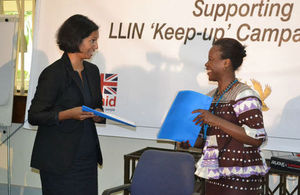UK Government and UNICEF cooperate to increase use of bednets to reduce burden of malaria in Ghana
The UK government through the Department for International Development (DFID) will work with UNICEF to increase the use of long lasting insecticide nets (LLINs) in Ghana.

Charlotte Pierre
The UK government through the Department for International Development (DFID), will work with UNICEF to increase the use of long lasting insecticide nets (LLINs) in Ghana. DFID will provide US$1.8 million over two years for a programme of behaviour change communication to encourage families to sleep under LLINs at all times. UNICEF together with key partners has been using behaviour and social change initiatives to promote positive and measurable change in Ghana.
Through the Ghana Health Service and other key partners this support will strengthen Ghana’s efforts to fight malaria, the leading cause of illness and mortality especially amongst children less than five years old. This support will contribute towards meeting the national target of ensuring that at least 80% of Ghanaians sleep under LLINs by 2015.
DFID and UNICEF will build on previous successes in malaria control in Ghana. We have implemented two projects together under the strategic leadership of the National Malaria Control Programme and in collaboration with other partners – procurement and distribution of LLINs and the “hang a net” campaign. Both contributed to more than 90% ownership of LLINs among the general population in Ghana. In addition, with DFID funding UNICEF has itself procured over 12.8 million LLINs over the last few years.
The focus of this new support is to bridge the gap between ownership and use whilst establishing a social norm that ensures people proactively purchase, use and replace their LLINs when required. Ms. Susan Namondo Ngongi, UNICEF Representative said “It’s not enough that each household owns the nets, sleeping under the net every night is what will have an impact on reducing Malaria cases, it’s a simple effective way of preventing malaria and reducing child deaths”.
Evidence shows that the combination of mass distribution of LLINs and Communication for Behaviour and Social Change undertaken by UNICEF and others has resulted in increasing knowledge about LLINs and their benefits. This has resulted in more people sleeping under LLINs every night. But much more needs to be done to ensure this trend continues and to target those who do not use LLINs on a regular basis.
Ms Sally Taylor, DFID Ghana Country Director said “The UK Government is committed to supporting the Government of Ghana’s efforts to reduce malaria by 75% by 2015. A key element to achieving this target is to translate the high ownership of LLINs (over 90%) into high LLINs usage - sleeping under treated bednets has shown to be effective in reducing malaria especially among children under 5 and pregnant women who are most at risk”.
DFID’s support will extend nationally through mass media campaigns with specific community mobilisation interventions in areas where LLIN use is low.